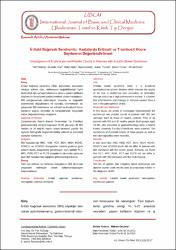| dc.contributor.author | Tülübaş, Feti | |
| dc.contributor.author | Oran, Mustafa | |
| dc.contributor.author | Mete, Rafet | |
| dc.contributor.author | Güneş, Hayati | |
| dc.contributor.author | Yüksek, Adnan | |
| dc.contributor.author | Yılmaz, Ahsen | |
| dc.contributor.author | Gürel, Ahmet | |
| dc.date.accessioned | 2017-07-31T14:15:43Z | |
| dc.date.available | 2017-07-31T14:15:43Z | |
| dc.date.issued | 2013 | |
| dc.identifier.uri | https://hdl.handle.net/20.500.11776/2181 | |
| dc.description.abstract | Amaç İrritabl bağırsak sendromu (İBS), toplumdaki prevalansı oldukça yüksek olan, defekasyon değişiklikleriyle ilişkili abdominal ağrı ve/veya rahatsızlık sonucu yaşam kalitesini düşüren bir fonksiyonel gastrointestinal sistem hastalığıdır. İBS patogenezinde inflamasyon oluşumu ve bağışıklık sistemindeki değişikliklerin rol oynadığı bilinmektedir. Bu çalışmada İBS hastalarına ait eritrosit ve trombosit hücre sayılarını sağlıklı kontroller ile karşılaştırarak prognostik olarak değerlendirmeyi amaçladık. Materyal ve Metod Çalışmamızda Namık Kemal Üniversitesi Tıp Fakültesi gastroenteroloji kliniğine başvuran 18-50 yaş arası 30 İBS hastası ve 30 sağlıklı kişinin dosya taraması yapıldı. Bu kişilerin demografik bilgileri ile birlikte eritrosit ve trombosit düzeyleri kaydedildi. Bulgular İBS hastalarında RBC, HGB, HCT, MCV, MCH, MCHC, RDWCV ve RDWSD düzeylerinin kontrol grubuna göre anlamlı olarak değişmediği görülmüştür. Aynı şekilde PLT, MPV, PDW, PCT ve PLCR düzeylerinin de kontrol grubuna göre İBS hastalarında değişiklik göstermediğini bulduk. Sonuç Tam kan eritrosit ve trombosit düzeylerinin İBS tanısında prognostik belirteçler olarak kullanılamayacağını düşünmekteyiz. | en_US |
| dc.description.abstract | Aim Irritable bowel syndrome (IBS) is a functional gastrointestinal system disease which reduces the quality of life due to abdominal pain secondary to defecation change and it has a high prevalence in society. It is known that inflammation and changes in immune system have a role in the pathogenesis of IBS. Materials and Methods In this study, we aimed to investigate retrospectively the erythrocyte and platelet counts of patients with IBS and compare them to those of healthy controls. Files of 30 patients with IBS and 30 healthy people (both groups aged 18-50), who consulted to gastroenterology clinic in Namik Kemal University Faculty of Medicine, were scanned. The erythrocyte and platelet counts of these people as well as their demographics were recorded. Results It was seen that RBC, HGB, HCT, MCV, MCH, MCHC, RDWCV and RDWSD levels did not differ in patients with IBS compared with the control group. Similarly, we found that PLT, MPV, PDW, PCT and PLCR did not differ in patients with IBS compared with the control group. Conclusion We are of opinion that complete blood erythrocyte and platelet counts could not be used as prognostic marker in the diagnosis of IBS. | en_US |
| dc.language.iso | tur | en_US |
| dc.publisher | Namık Kemal Üniversitesi | en_US |
| dc.rights | info:eu-repo/semantics/openAccess | en_US |
| dc.subject | İrritabl bağırsak sendromu | en_US |
| dc.subject | hemoglobin | en_US |
| dc.subject | eritrosit | en_US |
| dc.subject | trombosit | en_US |
| dc.subject | Irritable bowel syndrome | en_US |
| dc.subject | hemoglobin | en_US |
| dc.subject | erythrocyte | en_US |
| dc.subject | platelet | en_US |
| dc.title | İrritabl Bağırsak Sendromlu Hastalarda Eritrosit ve Trombosit Hücre Sayılarının Değerlendirilmesi | en_US |
| dc.title.alternative | Investigation of Erythrocyte and Platelet Counts in Patients with Irritable Bowel Syndrome | en_US |
| dc.type | article | en_US |
| dc.relation.ispartof | Namık Kemal Tıp Dergisi (International Journal of Basic and Clinical Medicine) | en_US |
| dc.department | Enstitüler, Sağlık Bilimleri Enstitüsü | en_US |
| dc.authorid | 104687 | en_US |
| dc.authorid | 184474 | en_US |
| dc.authorid | 163640 | en_US |
| dc.authorid | 109121 | en_US |
| dc.authorid | 145536 | en_US |
| dc.authorid | 197416 | en_US |
| dc.authorid | 9987 | en_US |
| dc.identifier.volume | 1 | en_US |
| dc.identifier.issue | 1 | en_US |
| dc.identifier.startpage | 23 | en_US |
| dc.identifier.endpage | 27 | en_US |
| dc.relation.publicationcategory | Makale - Ulusal Hakemli Dergi - Kurum Öğretim Elemanı | en_US |



















